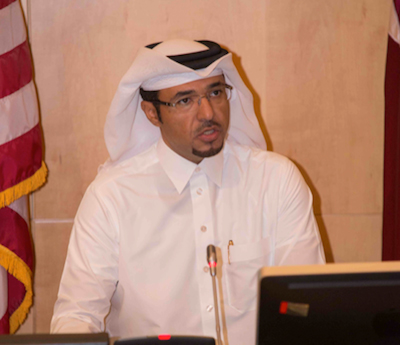WCMC-Q symposium explores ways to transcend cultural barriers to healthcare
March, 2014

Dr. Marcellina Mian (WCMC-Q), Dr. Khalid A. Alyafei (HMC), Dr. Jeffrey M. Ring (White Memorial Medical Center, Los Angeles), Dr. Jamal Rashid Al-Khanji (Supreme Council of Health), Dr. Robert C. Like (Rutgers Robert Wood Johnson Medical School, New Jersey) and Dr. Ravinder Mamtani (WCMC-Q) take part in a panel discussion at the symposium.
Experts from the United States visited Weill Cornell Medical College in Qatar (WCMC-Q) to speak at the country’s first cultural competence in healthcare symposium.
The one-day event, entitled Culturally Competent Patient-Centered Healthcare: A Special Focus on Qatar, was hosted by WCMC-Q’s Department of Global and Public Health.
Delegates discussed topics relating to the practice of medicine in international settings, the challenges posed by language barriers and cultural sensitivities, and strategies to mitigate these issues in order to provide the best possible healthcare to patients from a diverse range of backgrounds.
The symposium opened with a keynote address by Dr. Jamal Rashid Al-Khanji, Director of Healthcare Quality and Patient Safety, and Acting CEO of the Supreme Council of Health’s Qatar Council for Healthcare Practitioners.
Dr. Ravinder Mamtani, Associate Dean for Global and Public Health at WCMC-Q, also addressed the symposium, explaining that published reports have revealed that approximately 190 languages are spoken in Qatar. The Center for Cultural Competence in Healthcare was established at WCMC-Q in 2008 with a view to providing training in cultural competence to students and healthcare practitioners, said Dr. Mamtani.

Dr. Jamal Rashid Al-Khanji, Director of Healthcare Quality and
Patient Safety, and Acting CEO of the Supreme Council of
Health's Qatar Council for Healthcare Practitioners.
Dr. Robert C. Like, Professor and Director of the Center for Healthy Families and Cultural Diversity at Rutgers Robert Wood Johnson Medical School New Jersey, USA, gave a talk on cultural competence and patient-centered care.
Dr. Like said: “Differences in language, cultural background and ethnicity can all be barriers to care, but with training healthcare providers can transcend those barriers and help patients access the care they need.
“The fact that cultural competency training is being introduced with a countrywide approach in Qatar means there is an opportunity for it to be truly transformative and to have a really positive effect on healthcare outcomes.”
Dr. Jeffrey Ring, Director of Behavioral Sciences and Cultural Medicine at the White Memorial Medical Center, and Clinical Professor of Family Medicine at the Keck School of Medicine at the University of Southern California, USA, spoke about education and research in the field of cultural competence. His address was followed by a speech entitled The Role of Health Education in Patient Safety Competencies by Dr. Khalid A. Alyafei, Program Director of the Pediatric Emergency Medicine Fellowship at Hamad Medical Corporation (HMC).
The symposium, held on Monday 17 March, was attended by WCMC-Q researchers, faculty and students, as well as by nurses and physicians from Hamad Medical Corporation. The aim of the symposium was to show how cultural competence in healthcare can enhance patient-provider communication, eliminate disparities in access to healthcare and ultimately improve healthcare outcomes.
Maha Elnashar, Director of the Center for Cultural Competence in Healthcare, said: “Our aim with the symposium was to support the ongoing process of building understanding between healthcare practitioners and patients, no matter where in the world they come from or what language they speak. It was very encouraging to see so many healthcare providers here at the event to share their experiences and knowledge with each other.”
A panel discussion and Q&A session chaired by Dr. Marcellina Mian, WCMC-Q’s Associate Dean for Medical Education, was held near the end of the event to reflect on the topics raised by the healthcare professionals at the symposium. The event concluded with remarks by Dr. Sohaila Cheema, Director of WCMC-Q’s Department of Global and Public Health.
Reflecting on the importance of cultural competence training, Dr. Mamtani said: “As the world becomes increasingly globalized it is incumbent upon healthcare providers and educational institutions to acknowledge the diverse cultural sensibilities, languages and customs of the patients that we serve. We all have a duty to ensure that we show compassion, understanding and patience so that everyone can receive the care that they need, which is why events like this one are so important.”
